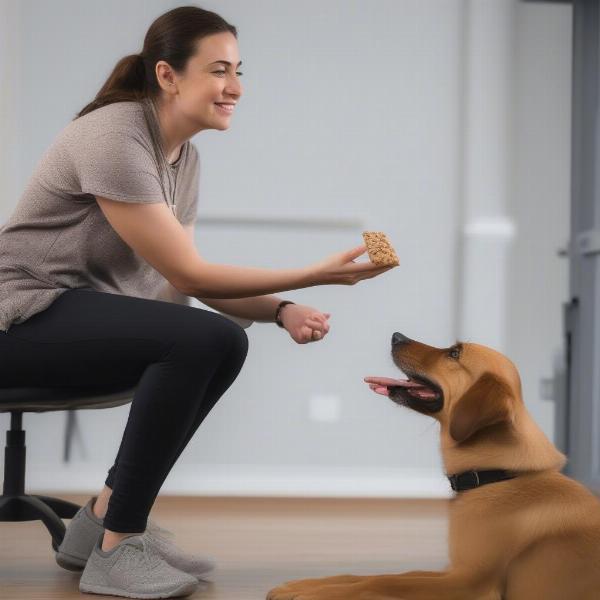The term “devil dogs” often conjures images of fierce, intimidating canines. While this moniker has historically been associated with specific breeds, particularly the Doberman Pinscher during World War I, it’s crucial to understand that any dog, regardless of breed, can exhibit aggressive behavior if not properly trained and socialized. This article delves into the “devil dogs hostess” concept, exploring the myths surrounding aggressive breeds and providing guidance on selecting a dog that aligns with your lifestyle and capabilities.
Choosing a dog is a significant decision that requires careful consideration. It’s essential to look beyond labels like “devil dogs” and focus on understanding individual dog temperaments, breed characteristics, and the importance of responsible ownership. Whether you’re an experienced dog owner or a first-timer, this article will equip you with the knowledge to make an informed choice and avoid perpetuating harmful stereotypes.
Debunking the “Devil Dog” Myth
The idea of inherently “devilish” dogs is a misconception. Aggression in dogs is a complex issue influenced by genetics, environment, and training. While certain breeds may have a predisposition towards protective behaviors, proper socialization and consistent training are crucial in shaping a dog’s temperament. Labeling a dog as “devilish” overlooks the nuances of canine behavior and perpetuates harmful stereotypes that can lead to breed-specific prejudice.
Choosing the Right Dog for You: Beyond the Label
Selecting a dog should be a well-informed decision, not based on myths and labels. Consider factors such as your living situation, activity level, and experience with dogs. Research different breeds, paying attention to their temperament, energy levels, and grooming needs.
Considering Breed Characteristics
Each breed possesses unique traits, and understanding these characteristics is vital in finding a compatible companion. For example, herding breeds like Border Collies thrive on mental and physical stimulation, while breeds like Bulldogs prefer a more laid-back lifestyle. Researching breed-specific traits can help you identify a dog that fits your lifestyle and expectations.
The Importance of Temperament Testing
Temperament testing can provide valuable insights into a dog’s personality and potential behavioral tendencies. These tests assess a dog’s reactions to various stimuli and situations, helping you determine if they are a good fit for your family and lifestyle.
Responsible Ownership: Nurturing a Well-Behaved Companion
Regardless of breed, responsible ownership is paramount in shaping a well-behaved dog. This includes providing proper socialization, consistent training, adequate exercise, and a nurturing environment. A well-socialized and trained dog is less likely to exhibit aggressive behaviors and will become a valued member of your family.
Socialization is Key
Early socialization exposes puppies to various sights, sounds, people, and other animals, helping them develop into well-adjusted adults. Continued socialization throughout a dog’s life is essential for maintaining their confidence and reducing the risk of fear-based aggression.
Training for Success
Consistent training establishes clear boundaries and expectations, fostering a strong bond between you and your dog. Positive reinforcement methods are highly effective and build a positive relationship based on trust and mutual respect.
 Dog receiving a treat during training
Dog receiving a treat during training
Conclusion
The term “devil dogs hostess” reflects outdated and harmful stereotypes. Choosing the right dog is about understanding individual temperaments, breed characteristics, and committing to responsible ownership. By focusing on these factors, you can find a loving and well-behaved companion, regardless of breed labels. Avoid perpetuating harmful myths and embrace the diverse world of canine companionship.
FAQ
- What does “devil dogs” mean? The term “devil dogs” historically refers to Doberman Pinschers who served in World War I. It has since become a misnomer often associated with aggressive breeds.
- Are certain breeds inherently aggressive? No breed is inherently aggressive. Aggression is influenced by various factors, including genetics, environment, and training.
- How can I choose the right dog for me? Consider your lifestyle, living situation, and experience with dogs. Research breed characteristics and consider temperament testing.
- What is the importance of socialization? Socialization helps dogs develop into well-adjusted adults, reducing the risk of fear-based aggression.
- What are the best training methods? Positive reinforcement methods are highly effective in building a positive relationship and shaping desired behaviors.
- What does responsible dog ownership entail? It involves providing proper socialization, training, exercise, a nurturing environment, and meeting the dog’s physical and emotional needs.
- Where can I find more information about specific dog breeds? Reputable breed-specific rescue organizations and kennel clubs are excellent resources.
ILM Dog: Your Trusted Partner in Canine Care
ILM Dog is your go-to resource for all things dog-related. We offer expert advice on breed selection, health and medical care, training and behavior, nutrition, grooming, and much more. Whether you’re a seasoned dog owner or just starting your journey, ILM Dog provides valuable insights and practical tips to help you navigate the exciting world of dog ownership. Our experts are passionate about promoting responsible dog ownership and helping you build a strong, lasting bond with your canine companion. Contact us for all your dog-related questions and needs. Email: [email protected], Phone: +44 20-3965-8624.